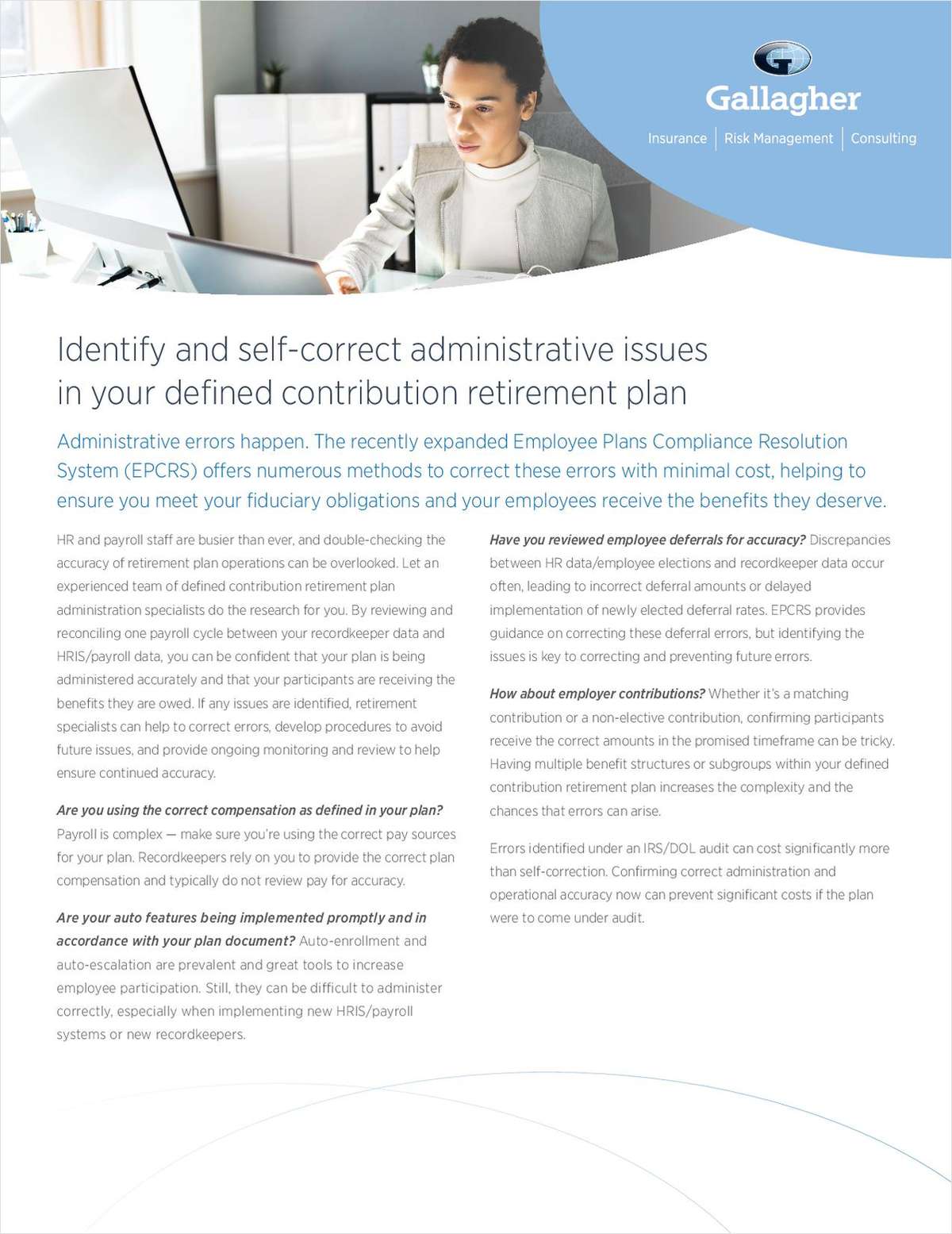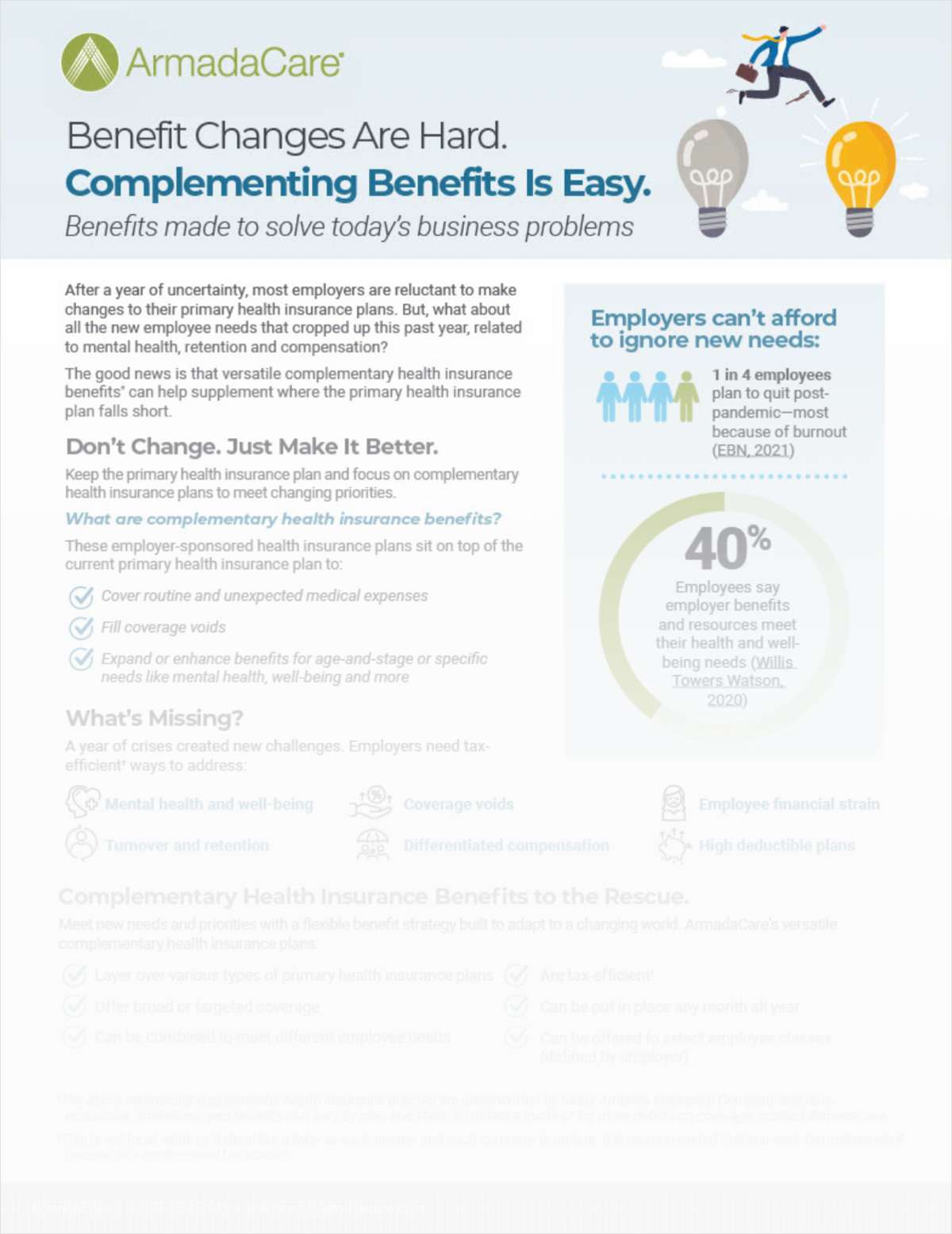Despite health reform, fewer Americans are confident employer-based health coverage will be available for them in the future.
According to the 2010 Health Confidence Survey (HCS) from the Employee Benefits Research Institute, 52 percent of individuals with employment-based coverage reported that they were extremely or very confident that their (or their spouse's) employer or union would continue to offer health insurance. That's down from 59 percent in 2009.
EBRI says the decline may be due to passage of health reform, the continuing weak economy, or both.
Overall dissatisfaction with the American health care system remains widespread, according to the survey, which was conducted two months after the passage of health care reform in March. A majority of Americans rate the health care system as poor (27 percent) or fair (31 percent).
"It is still too early to determine how the new health reform law is being received, but we do know Americans have been and continue to be unhappy with the nation's health care system," said Paul Fronstin, director of EBRI's Health Research and Education Program. "But people do see the law as detrimental to employment-based health coverage, which is where most Americans currently obtain their health insurance coverage."
Other findings:
- Confidence about various aspects of today's health care system has remained fairly level despite the passage of health reform. More than one-half of survey respondents report being extremely or very confident that they are able to get the treatments they need. Confidence in having enough choice about who provides medical care is largely unchanged from 2009 levels. The percentage of individuals who say they are extremely confident that they are able to afford health care without financial hardship increased from 11 percent to 16 percent between 2009 and 2010. The increase came at the expense of decreases in the percentage reporting that they were very or somewhat confident.
- Americans' ratings of their own health plan are generally favorable. Fifty-eight percent of those with health insurance coverage are extremely or very satisfied with their current plan, and 30 percent are somewhat satisfied.
- Satisfaction with health care quality continues to remain fairly high, with 59 percent of Americans saying they are extremely or very satisfied with the quality of the medical care they have received in the past two years. This is the highest level of satisfaction reported since the HCS was started in 1998. In contrast, just 22 percent are extremely or very satisfied with the cost of their health insurance, and only 19 percent are satisfied with the cost of health care services not covered by insurance.
- Confidence in the future availability of employment-based health benefits fell. In 2010, 52 percent of individuals with employment-based coverage reported that they were extremely or very confident that their (or their spouse's) employer or union would continue to offer health insurance, down from 59 percent in 2009. The decline may be due to passage of health reform, the continuing weak economy, or both.
- Many Americans see themselves as good consumers of the health care system. Three-quarters report that they always or often have their doctor or medical professional explain to them why a test was needed, and two-thirds say they ask their doctor about the risks of treatment or side effects of medications. Slightly more than one-half indicate they ask about the success rate of the treatment option. Fewer say they always or often bring a list of medications, bring a list of symptoms, ask about less costly treatment options or medications, or ask for less invasive or easier treatment options.
- Many Americans have tried to find objective information about various aspects of health care. Nearly one-half tried to find information on the advantages and disadvantages of different treatment options, whereas 1 in 3 tried to find information about a doctor's training and the costs of different treatments. Fewer had sought information on costs of doctors and hospitals, the number and success rate of hospital-based procedures, or disciplinary actions. Among those seeking information, between 17 percent and 35 percent found all of the information they sought, whereas between 54 percent and 72 percent found some of the information being sought.
- Many Americans may not be ready to use rating systems to make decisions about providers. Only about 1 in 3 indicates they would be extremely or very comfortable using such a rating system to find a doctor or hospital. Individuals rank the importance of information about the effectiveness of different types of treatments much more highly than a rating system based on cost. One-half think information about the effectiveness of different types of treatments would be extremely important if they were trying to choose a treatment, and 31 percent think it would be very important.
Get more: Most American's don't know exactly what's in new health reform laws, nor are they aware of how soon health care changes will impact them. Read "NAIC: Public clueless about first wave of health reform" online now.
Complete your profile to continue reading and get FREE access to BenefitsPRO, part of your ALM digital membership.
Your access to unlimited BenefitsPRO content isn’t changing.
Once you are an ALM digital member, you’ll receive:
- Breaking benefits news and analysis, on-site and via our newsletters and custom alerts
- Educational webcasts, white papers, and ebooks from industry thought leaders
- Critical converage of the property casualty insurance and financial advisory markets on our other ALM sites, PropertyCasualty360 and ThinkAdvisor
Already have an account? Sign In Now
© 2024 ALM Global, LLC, All Rights Reserved. Request academic re-use from www.copyright.com. All other uses, submit a request to [email protected]. For more information visit Asset & Logo Licensing.








